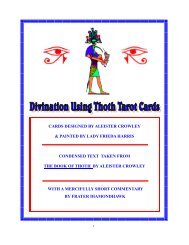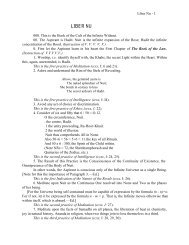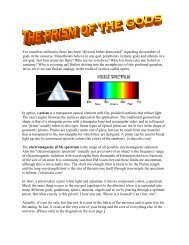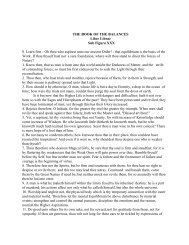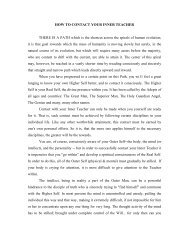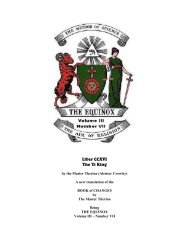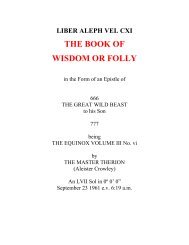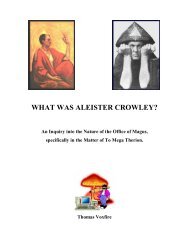Message of the Master Therion - Thomas Voxfire
Message of the Master Therion - Thomas Voxfire
Message of the Master Therion - Thomas Voxfire
Create successful ePaper yourself
Turn your PDF publications into a flip-book with our unique Google optimized e-Paper software.
Liber II<br />
The <strong>Message</strong> <strong>of</strong> The <strong>Master</strong> <strong>Therion</strong><br />
"Do what thou wilt shall be <strong>the</strong> whole <strong>of</strong> <strong>the</strong> Law."<br />
“Love is <strong>the</strong> law, love under will”<br />
"There is no Law beyond Do what thou wilt."<br />
"The word <strong>of</strong> <strong>the</strong> Law is ΘΕΛΗΜΑ”<br />
ΘΕΛΗΜΑ - Thelema - means Will. The Key to this <strong>Message</strong> is this word - Will. The first<br />
obvious meaning <strong>of</strong> this Law is confirmed by anti<strong>the</strong>sis; "The word <strong>of</strong> Sin is Restriction."<br />
Again: "Thou hast no right but to do thy will. Do that and no o<strong>the</strong>r shall say nay. For pure<br />
will, unassuaged <strong>of</strong> purpose, delivered from <strong>the</strong> lust <strong>of</strong> result, is every way perfect."<br />
Take this carefully; it seems to imply a <strong>the</strong>ory that if every man and every woman did his<br />
and her will - <strong>the</strong> true will - <strong>the</strong>re would be no clashing. "Every man and every woman is a star,"<br />
and each star moves in an appointed path without interference. There is plenty <strong>of</strong> room for all; it<br />
is only disorder that creates confusion.<br />
From <strong>the</strong>se considerations it should be clear that "Do what thou wilt" does not mean "Do<br />
what you like." It is <strong>the</strong> apo<strong>the</strong>osis <strong>of</strong> Freedom; but it is also <strong>the</strong> strictest possible bond.<br />
Do what thou wilt - <strong>the</strong>n do nothing else. Let nothing deflect <strong>the</strong>e from that austere and<br />
holy task. Liberty is absolute to do thy will; but seek to do any o<strong>the</strong>r thing whatever, and instantly<br />
obstacles must arise. Every act that is not in definite course <strong>of</strong> that one orbit is erratic, an<br />
hindrance. Will must not be two, but one.<br />
Note fur<strong>the</strong>r that this will is not only to be pure, that is, single, as explained above, but<br />
also "unassuaged <strong>of</strong> purpose." This strange phrase must give us pause. It may mean that any<br />
purpose in <strong>the</strong> will would damp it; clearly <strong>the</strong> "lust <strong>of</strong> result" is a thing from which it must be<br />
delivered.<br />
But <strong>the</strong> phrase may also be interpreted as if it read "with purpose unassuaged" - i.e., with<br />
tireless energy. The conception is, <strong>the</strong>refore, <strong>of</strong> an eternal motion, infinite and unalterable. It is<br />
Nirvana, only dynamic instead <strong>of</strong> static - and this comes to <strong>the</strong> same thing in <strong>the</strong> end.<br />
The obvious practical task <strong>of</strong> <strong>the</strong> magician is <strong>the</strong>n to discover what his will really is, so<br />
that he may do it in this manner, and he can best accomplish this by <strong>the</strong> practices <strong>of</strong> Liber<br />
Thisarb (see Equinox I(7), p. 105) or such o<strong>the</strong>rs as may from one time to ano<strong>the</strong>r be appointed.<br />
Thou must (1) Find out what is thy Will, (2) Do that Will with (a) one-pointedness, (b)<br />
detachment, (c) peace. Then, and <strong>the</strong>n only, art thou in harmony with <strong>the</strong> Movement <strong>of</strong> Things,<br />
thy will part <strong>of</strong>, and <strong>the</strong>refore equal to, <strong>the</strong> Will <strong>of</strong> God. And since <strong>the</strong> will is but <strong>the</strong> dynamic<br />
aspect <strong>of</strong> <strong>the</strong> self, and since two different selves could not possess identical wills; <strong>the</strong>n, if thy will<br />
be God's will, T There is but one o<strong>the</strong>r word to explain. Elsewhere it is written - surely for our<br />
great comfort - "Love is <strong>the</strong> law, love under will."<br />
This is to be taken as meaning that while Will is <strong>the</strong> Law, <strong>the</strong> nature <strong>of</strong> that Will is Love.<br />
But this Love is as it were a by-product <strong>of</strong> that Will; it does not contradict or supersede that Will;
and if apparent contradictions should arise in any crisis, it is <strong>the</strong> Will that will guide us aright.<br />
Lo, while in The Book <strong>of</strong> <strong>the</strong> Law is much <strong>of</strong> Love, <strong>the</strong>re is no word <strong>of</strong> Sentimentality. Hate<br />
itself is almost like Love! "As bro<strong>the</strong>rs fight ye!" All <strong>the</strong> manly races <strong>of</strong> <strong>the</strong> world understand<br />
this. The Love <strong>of</strong> Liber Legis is always bold, virile, even orgiastic. There is delicacy, but it is <strong>the</strong><br />
delicacy <strong>of</strong> strength. Mighty and terrible and glorious as it is, however, it is but <strong>the</strong> pennon upon<br />
<strong>the</strong> sacred lance <strong>of</strong> Will, <strong>the</strong> damascened inscription upon <strong>the</strong> swords <strong>of</strong> <strong>the</strong> Knight-monks <strong>of</strong><br />
Thelema.<br />
Love is <strong>the</strong> law, love under will.<br />
ΤΟ ΜΕΓΑ ΤΗΕΡΙΟΝ



